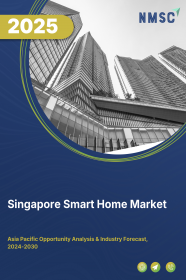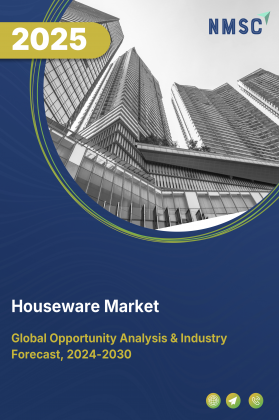
Singapore Smart Home Market by Product Type (Smart Lighting, Smart Home Security and Surveillance, Smart Entertainment, and Smart Appliances), by Communication Protocol (Wifi, Zigbee, Z-wave, Bluetooth, and Thread), by Smart Home Hubs (Standalone Hubs, and Built-in Hubs), by Voice Assistants Integration (Amazon Alexa, Goggle Assistant, Apple Siri, and Others), by Smart Home Compatibility with Smartphones (iOS, and Android), and Others – Opportunity Analysis and Industry Forecast, 2024–2030
Industry: Retail and Consumer | Publish Date: 05-Sep-2025 | No of Pages: 113 | No. of Tables: 142 | No. of Figures: 87 | Format: PDF | Report Code : RC2281
Singapore Smart Home Market Overview
The Singapore Smart Home Market size was valued at USD 1.79 billion in 2023, and is predicted to reach USD 7.90 billion by 2030, at a CAGR of 23.6% from 2024 to 2030. A smart home, also referred to as a connected home, is a residential space equipped with cutting-edge technology and automation systems. These systems allow for the centralized control and monitoring of a wide range of household devices, appliances, and security features through a unified network. The smart home devices can be managed remotely and often respond to voice commands or pre-set schedules, providing homeowners with enhanced convenience, energy efficiency, and security. Connected homes typically incorporate components such as smart thermostats, lighting systems, security cameras, voice assistants, and other interconnected devices, all aimed at enhancing the overall living experience.
Government-led Smart Nation Policies Driving Residential Digitalization
The Singapore government plays a central role in accelerating smart home adoption through its broader Smart Nation vision. Initiatives such as the HDB Smart Urban Habitat program and the Green Towns Programme are actively embedding smart technologies into public housing developments, setting new standards for connected living. These policies promote the use of smart lighting, energy monitoring systems, and integrated security features in residential environments. By offering incentives and embedding digital infrastructure in urban planning, the government is not only advancing sustainability goals but also ensuring that smart homes become a fundamental part of Singapore’s modern housing landscape.
Innovation-driven Ecosystem Enhancing Smart Home Experiences
Singapore’s dynamic tech ecosystem and innovation-oriented market environment are rapidly transforming the smart home landscape. With a strong presence of global tech companies and local startups, the market is seeing continuous rollouts of cutting-edge smart devices—ranging from AI-powered assistants and voice-controlled systems to fully automated home environments. Consumers benefit from seamless integration, personalized functionality, and remote accessibility, all supported by Singapore’s superior broadband infrastructure. This innovation-led environment not only raises user expectations but also fuels widespread consumer adoption, positioning Singapore at the forefront of connected living in Asia.
Data Privacy and Cybersecurity Risks Hinder Adoption
Despite its growth trajectory, the Singapore smart home market faces challenges related to data privacy and cyber threats. As households increasingly rely on connected devices for daily tasks, concerns over unauthorized access and data breaches remain prominent. Devices such as smart locks, cameras, and voice assistants can become entry points for cyber intrusions if not adequately secured. Singapore's tech-savvy population is also highly aware of digital vulnerabilities, which makes privacy protection a critical consideration before adoption. While cybersecurity frameworks and consumer education efforts are improving, the perceived risk of exposing sensitive data continues to act as a psychological barrier, particularly for older or security-conscious homeowners.
Blockchain Integration Unlocking the Next Wave of Secure Smart Living
Blockchain technology is emerging as a transformative opportunity within Singapore’s smart home landscape. With its decentralized and tamper-proof architecture, blockchain enhances the security and transparency of smart ecosystems. Its implementation can secure data transmission between devices, authenticate identities, and streamline automation through smart contracts. In a digitally advanced market like Singapore, where trust and security are critical, blockchain-enabled smart homes can offer unparalleled control and protection over personal information and device interaction. As local tech firms and global players explore blockchain applications, this innovation is expected to redefine how connected homes are built, managed, and trusted—ushering in a new era of intelligent and secure living.
Competitive Landscape
Several market players operating in the Singapore smart home industry include Samsung Electronics, LG Electronics, Amazon (Echo/Alexa), Google, Signify (Philips Hue), Bosch, Schneider Electric, Honeywell International, ABB Ltd, Hitachi, Ltd, Panasonic Corporation, Legrand, Xiaomi, Apple Inc, Sony.
Singapore Smart Home Market Key Segments
By Product Type
-
Smart Lighting
-
Smart Bulbs
-
Smart Light Strips
-
Smart Switches
-
-
Smart Home Security and Surveillance
-
Smart Cameras
-
Video Doorbells
-
Smart Locks
-
Security System
-
-
Smart Entertainment
-
Smart TVs
-
Smart Speakers
-
Streaming Devices
-
-
Smart Appliances
-
Smart Refrigerators
-
Smart Ovens
-
Smart Washing Machines
-
Smart Dishwashers
-
Smart Home HVAC Management
-
Smart Rice Cooker
-
Smart Pantry/Storage System
-
Smart Blender
-
Other Smart Appliances
-
By Communication Protocol
-
Wi-Fi
-
Zigbee
-
Z-wave
-
Bluetooth
-
Thread
By Smart Home Hubs
-
Standalone Hubs
-
Built-in Hubs
By Voice Assistants Integration
-
Amazon Alexa
-
Google Assistant
-
Apple Siri
-
Others
By Smart Home Compatibility with Smartphones
-
iOS
-
Android
By Installation
-
DIY Installation
-
Professional Installation
By Sales Channel
-
Online
-
E-Commerce Platforms
-
Company Websites
-
-
Offline
-
Retail Stores
-
Supermarkets & Hypermarkets
-
Specialty Stores
-
Key Players
-
Samsung Electronics
-
LG Electronics
-
Amazon (Echo/Alexa)
-
Google
-
Signify (Philips Hue)
-
Bosch
-
Schneider Electric
-
Honeywell International
-
ABB Ltd
-
Hitachi, Ltd.
-
Panasonic Corporation
-
Legrand
-
Xiaomi
-
Apple Inc.
-
Sony
Report Scope and Segmentation
|
Parameters |
Details |
|
Market Size in 2023 |
USD 1.79 Billion |
|
Revenue Forecast in 2030 |
USD 7.90 Billion |
|
Growth Rate |
CAGR of 23.6% from 2024 to 2030 |
|
Analysis Period |
2023–2030 |
|
Base Year Considered |
2023 |
|
Forecast Period |
2024–2030 |
|
Market Size Estimation |
Billion (USD) |
|
Growth Factors |
|
|
Companies Profiled |
15 |
|
Market Share |
Available for 10 companies |
|
Customization Scope |
Free customization (equivalent up to 80 working hours of analysts) after purchase. Addition or alteration to country, regional, and segment scope. |
|
Pricing and Purchase Options |
Avail customized purchase options to meet your exact research needs. |

















 Speak to Our Analyst
Speak to Our Analyst
























